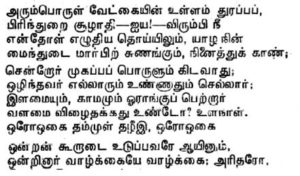By Kollengode S Venkataraman
e-mail: Â thePatrika@aol.com
The boom of the petrodollars saw working-class people from many parts of Asia go to the Arabian Peninsula seeking high-paying jobs under horrible living conditions. The lure of money forced men to be away from their wives and family for the greater part of the year, giving rise to many social problems. Later, globalization made this a worldwide trend.
A 2000-year old Tamil literary work tells us that men going to far-off lands searching for fortunes is not a new phenomenon. Here is a verse from Kalittogai by the poet Perum-kadum-Ko. (Source: Kalittogai Telivurai by Puliyur Kesigan, Pari Nilayam, Chennai, 2005). The confidante of a married woman tries to dissuade her husband contemplating a voyage seeking fortunes, like men today leaving their wives to “go abroadâ€:

Gist of the message: “Sir, Don’t live with thoughts of living away from your woman for earning fortunes in far-off lands. See the imprints you two have caused to each other while in tight embrace. The fortunes you think you’re going to amass are not going to stay with you. Also know that men who do not go on this type of fortune hunting are not starving either.
“Couples with youth and passion for each other — do they ever care for material things to make them happy? Besides, does wealth have any redeeming quality better than youth and passion for people in love?
“When couples have youth and passion for each other, they would rather live in each other’s embrace, even if they live with scarce resources, with only simple garments to wrap themselves with. Living with each other thus is what happiness is for couples in love.
“With fortunes earned thus, is it ever possible to regain the youth that will be gone when you’re away?â€
We don’t know if the young man stayed home with his beloved. Probably not. After all, most readers of this article did not heed similar advice from their parents, if not from the confidantes of their beloved.
— By Kollengode S VenkataramanÂ
